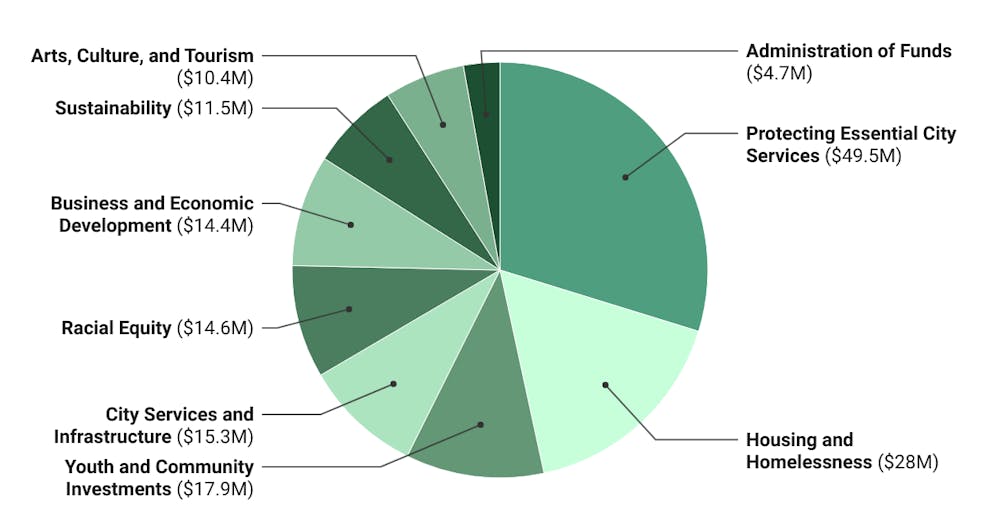Mayor Jorge Elorza shared his recommendation on how to spend $123.8 million of remaining funds from the American Rescue Plan Act over the next two years in a Jan. 5 press conference. The plan was based on recommendations submitted by the COVID-19 Providence Recovery and Resiliency Task Force, which met with residents, community organizations and small businesses from July to Nov. 2021, according to the PVD Rescue Plan’s website.
The task force’s recommendations placed housing and homelessness as a top priority, allocating $28 million in funds to this category, according to the plan’s website. The next highest-funded categories were youth and community investments, city services and infrastructure and racial equity, with $17.9 million, $15.3 million and $14.6 million allocated, respectively. Other categories included business and economic development, sustainability and arts, culture and tourism.
About $2.6 million in ARPA funding will go towards an anti-violence initiative to reduce violent crime in the city, The Herald previously reported.
The task force members, who were recommended by the Providence City Council, sought feedback from the community on the allocation of ARPA funds, according to Task Force Co-Chair Angela Ankoma, who is the vice president and executive director of equity leadership for the Rhode Island Foundation. Ankoma explained that their goal was to take the main priorities from the community and use those to inform their recommendations to Elorza and the City Council.
“We had open meetings for a good two months,” Ankoma said. “We also partnered with other members of the community to hold community engagement conversations so people could provide feedback.”
The task force held five community engagement events co-hosted by six different community-based organizations, which included the NAACP Providence, the Latino Policy Institute, Facilitate Change, the Alliance of Rhode Island Southeast Asians for Education, the South Providence Neighborhood Association and Direct Action for Rights and Equality, Ankoma added.
During this time period, the task force surveyed 1,111 community members to receive additional feedback and collect demographic data, according to Ankoma. “There were slight variations across various neighborhoods, but the main three or four things (were) … housing, racial equity and oftentimes a toss-up between youth and community services or business economic development,” Ankoma said.
Housing was the primary issue that residents wanted to see acted on during these meetings, according to Oscar Meijas, task force co-chair and CEO of the Rhode Island Hispanic Chamber of Commerce. He shared that it was emotionally difficult at times to listen to community members’ experiences with housing.
“From the emotional point of view, it’s not easy, because it is a very sensitive conversation space,” Mejias said.
But Mejias felt that the Mayor’s release of the budget plans at the press conference helped increase residents’ confidence in how the ARPA funds will be put to use.
“They hope and are optimistic in terms of the use of the funding,” Mejias said. “Once we had the opportunity to explain how it will be spent in the next year … while looking at sustainability and long-term effects, people have started to feel confident that the funding will be used in the right way.”
While the task force has submitted its recommendations, there are still steps ahead before the plan can be approved and implemented.
“There is a process that it has to go through to get approved by the city,” Ankoma said. “It’s not a done deal because those meetings still have to take place.”
As a part of this process, the City Council’s Finance Committee discussed the topic of housing and various strategies and programs to be funded in a meeting Tuesday.
“Once a budget is passed by the City Council and signed into law by Mayor Elorza, we hope to immediately work to implement programs,” Faith Chadwick, director of communications for the mayor’s office, wrote in an email to The Herald. “The timeline for distributing or using funds will vary depending on the project or budget item. However, all funds need to be allocated within three years and expended within five years.”
Ashley Guo is an arts & culture writer and layout designer. She previously covered city and state politics as a Metro section editor. In her free time, Ashley enjoys listening to music, swimming, and reading!





